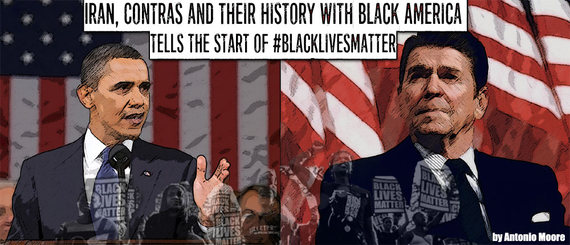Last week a political firestorm was set off by the accusation that the recent payment by the United States to Iran in the amount of 400 million dollars was possibly sent in exchange for hostages. The Obama administration's position is clear that this was not a ransom payment, rather it was funds the U.S. has owed the Islamic republic for over 35 years. A debt that they say dates back to when Iranian funds in U.S. banks were frozen as a result of the seizure of the U.S. embassy in Tehran.
What we are failing to also discuss is the backstory of United States involvement with Iran, a story which must be told through the chapters of the Iran Contra Scandal and its unresolved damage to black America. In an era of #blacklivesmatter no modern scandal more underscores the hypocrisy of our country's drug policy, and approach to dealing with the resulting mass incarceration of African Americans. To now have the first black president presiding over a 400 million dollar repayment to Iran today, that is even remotely similar, or connected to the scandal that happened under President Ronald Reagan is unthinkable. Salon.com wrote this in the piece "The scandal that almost destroyed Ronald Reagan" explaining the Iran Contra Scandal, and Reagan's involvement,
On Nov. 13, 1986, President Reagan declared in a national address, "We did not -- repeat -- did not trade weapons or anything else for hostages -- nor will we." His assertion ran counter to covert operations that had been ongoing for several years. ... Reagan found himself in the midst of a crisis that threatened his presidency. Covert arms transactions with Iran and the diversion of profits of the sales to the Contra guerrilla force in Nicaragua lay at the heart of the controversy. ... They were carried out by members of the National Security Council, including National Security Advisors Robert McFarlane and John Poindexter and Lt. Col. Oliver North, an NSC staff member. On account of the Iran-Iraq war, restrictions on arms sales to Iran were in place at the time of the weapons transfers. Members of Reagan's own administration and members of Congress believed that the administration's decree that there should be no deals with terrorists was being adhered to.
In Central America, different challenges faced the president. Congress had enacted several restrictions on the nature of government aid that could be supplied to the Contras, a guerrilla army fighting the leftist Sandinista government in Nicaragua. The Boland Amendment specified the volume of funds that could be spent on this cause and the type of assistance that could be provided. The Contra cause was passionately supported by Reagan. Beginning in 1984, members of the National Security Council, particularly North, began seeking alternative non-U.S. government sources of support. King Fahd of Saudi Arabia, for example, provided a million dollars per month from May to December 1984. The upkeep of the Contras continued in a covert fashion, with support from a disparate array of U.S. government officials, opportunistic middlemen and operatives in the NSC and CIA. In essence, Reagan's foreign policy was being privatized and shielded from both Congress and the American people.
The underbelly of this was the now supported accusation that to fund the Contra revolution the Reagan administration along with the proceeds from Iran arms sales, was also using the profits from cocaine drug sales by Nicaraguans in the United States. When Reagan's request for funding for those he called the "Nicaraguan freedom fighters" was turned down by Congress, the administration purportedly turned to crack cocaine sales to fund their efforts. Recently our film "Freeway Crack in the System" was nominated for an Emmy in the category of Outstanding Investigative Journalism, for digging deeper and uncovering truths around this dark history. As we show in our film Nicaraguan Drug Kingpin Danilo Blandon admitted to much of this on the stand during criminal hearings.
In response to a question about cocaine sales in America, "You were running the LA operation, is that correct?". Blandon stated, "But remember, we were running... Just whatever we were running in L.A. it goes the profit it was going to the Contra Revolution"
This scandal and the hypocrisy of a nation that has imprisoned so many for crack cocaine, while possibly using the proceeds of the illicit sales to further national interest is mind boggling. Despite President Obama commuting a few hundred sentences, hundreds of thousands remain behind bars as a result of the Iran Contra Scandal. It is now more than necessary to have the scandal rehashed as we look closer at the payment to Iran of unmarked currency tied to similar time periods.
This is the great tragedy of #blacklivesmatter. It is truly a movement with deep roots, birthed by political failures that reach deep into many prison cells within our borders, and economic interest across the globe.
Antonio Moore, an attorney based in Los Angeles, is one of the producers of the Emmy-nominated documentary Freeway: Crack in the System. Follow him on YouTube Channel Tonetalks.

